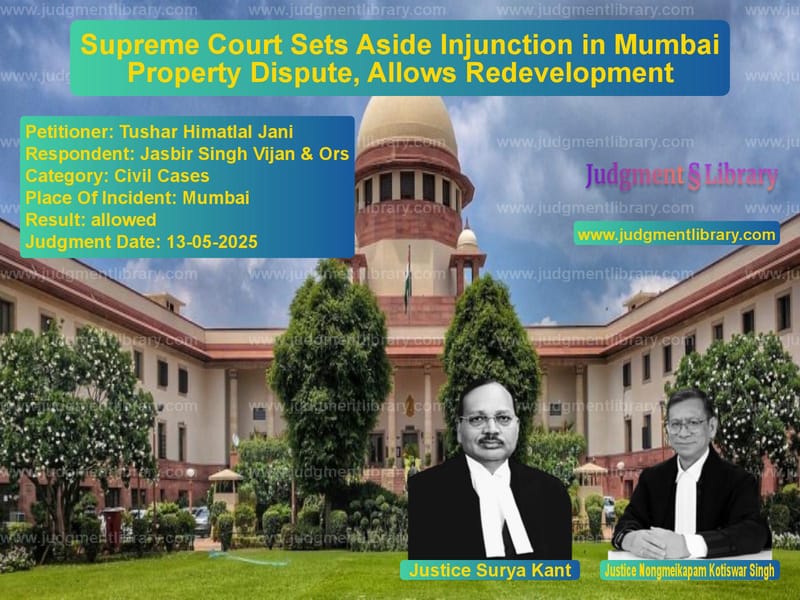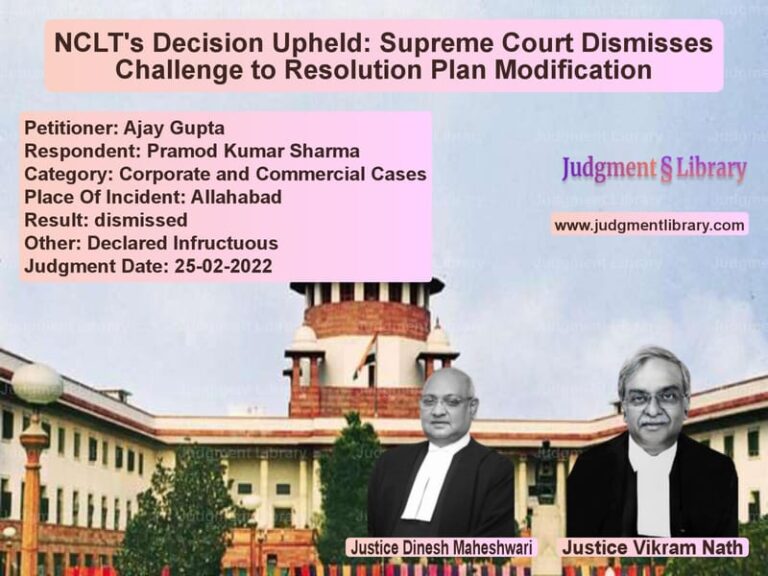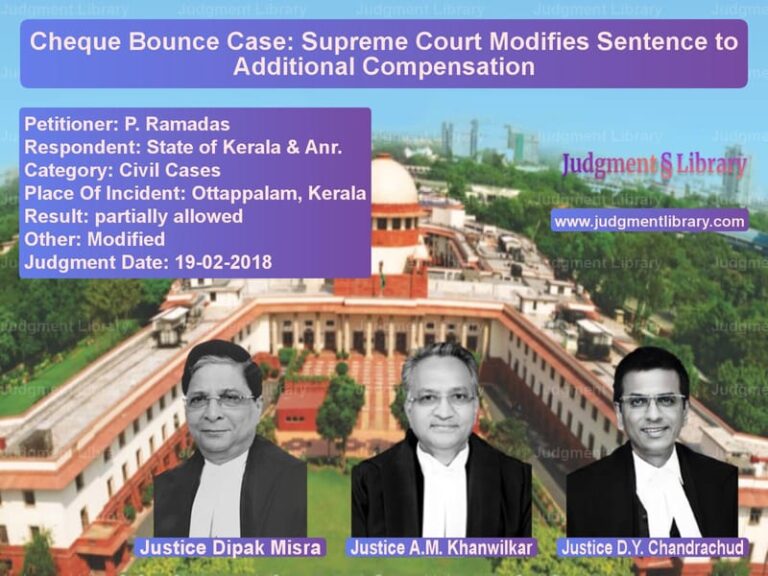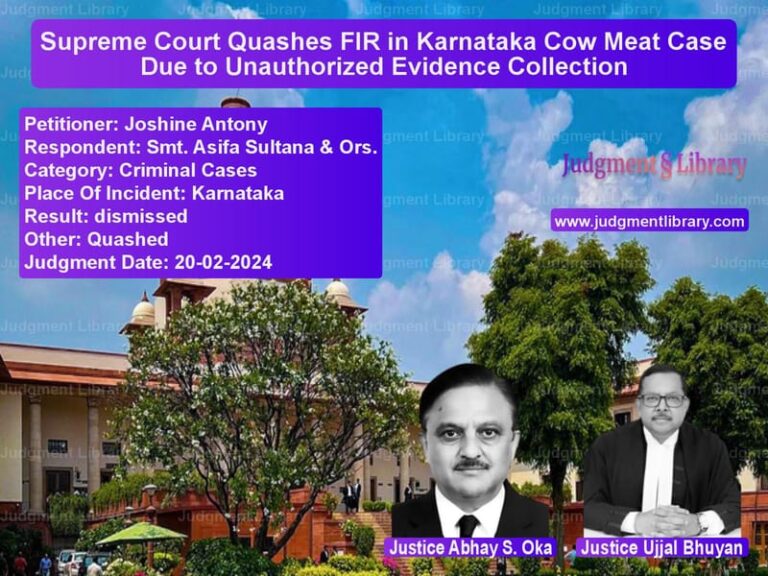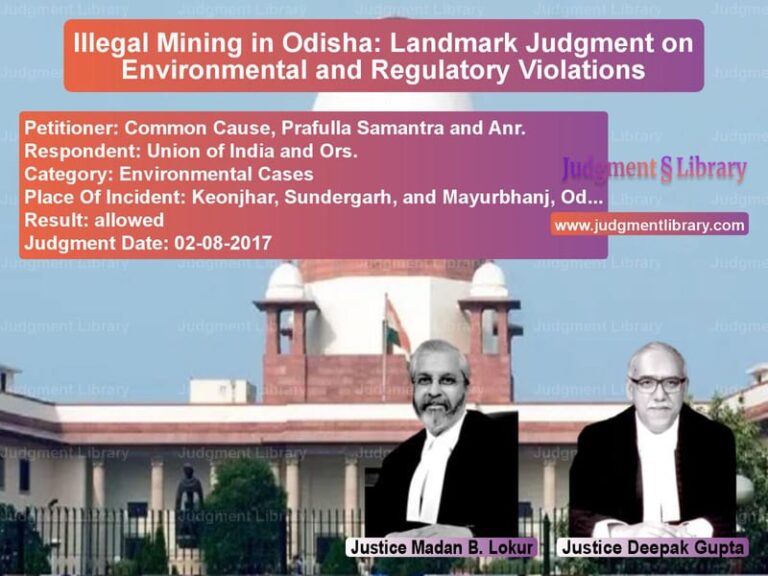Supreme Court Sets Aside Injunction in Mumbai Property Dispute, Allows Redevelopment
In a significant property dispute case from Mumbai, the Supreme Court of India has delivered a crucial judgment setting aside a High Court injunction that had stalled a major redevelopment project over a small disputed portion of land. The case involved Tushar Himatlal Jani, the owner of a 22,000 square feet plot in Chembur, Mumbai, and Jasbir Singh Vijan, who claimed tenancy rights over a mere 550 square feet area within the larger property.
The legal battle has its roots in a 1972 lease agreement when the appellant’s father leased 11,250 square feet of the property to a partnership firm called M/s Silver Chem (India), which was owned by members of the Vijan family. After inheriting the property, Tushar Jani terminated the lease agreement in 2008 and filed an eviction suit before the Small Causes Court in Bombay. This marked the beginning of a complex legal journey that would span nearly two decades.
The dispute took an interesting turn when Jasbir Singh Vijan (Respondent No. 1) entered the picture, claiming to be a legal heir of one of the partners of the original tenant firm. He filed an impleadment application in the eviction suit, asserting that he had acquired an undivided share in the business through a Memorandum of Understanding among Vijan family members. The Small Causes Court initially allowed his impleadment in 2016, but this decision was later set aside by the Appellate Small Causes Court in 2019.
A significant development occurred when the Vijan family members entered into a Family Settlement Agreement on June 9, 2021, mediated through a court-appointed mediator. This agreement purportedly allocated 550 square feet of the property to Jasbir Singh Vijan. Following this settlement, the partners of the original tenant firm, along with Respondent No. 1, entered into a Lease and License Agreement with M/s KMG Global for the subject land without the owner’s knowledge or consent.
The plot thickened when the original tenant firm and its partners claimed to have surrendered their tenancy rights in October 2022. In response, Tushar Jani unconditionally withdrew his eviction suit in January 2023. He then entered into his own leave and license agreement with M/s KMG Global in April 2023 for a built-up area of 2,200 square feet, signaling his intention to proceed with redevelopment plans.
However, Jasbir Singh Vijan filed a fresh suit before the Small Causes Court, seeking declaration of his tenancy rights over the 550 square feet area based on the Family Settlement Agreement. He argued that any surrender of tenancy rights by the original firm without his consent would be illegal and non-binding. The Small Causes Court initially granted him interim protection, but this was overturned by the Appellate Bench in December 2023.
When the matter reached the Bombay High Court through a writ petition, the court restored the injunction in favor of Jasbir Singh Vijan, leading to the current appeal before the Supreme Court.
Before the Supreme Court, Senior Counsel Mr. Shyam Divan, representing the appellant Tushar Jani, made compelling arguments. He contended that “the impugned injunction order has effectively paralyzed the Appellant’s legitimate redevelopment plans, causing substantial financial detriment.” He emphasized that “despite the disputed area of 550 square feet being merely a small fragment of the entire property, the restraint qua this portion has brought the entire project to a grinding halt.” Mr. Divan further argued that “the High Court gravely erred in issuing an injunction in the absence of any eviction proceedings initiated by the Appellant against Respondent No. 1” and that “Respondent No. 1 lacks the locus standi to obstruct the Appellant’s development rights as he is neither in lawful nor actual possession of the subject land.”
On the other side, Senior Counsel Mr. Arunabh Chowdhury, representing Jasbir Singh Vijan, defended the injunction. He urged that “the impugned order is in the nature of a simpliciter injunction not to dispossess Respondent No.1 from the subject property without due process of law” and had been in force for over 20 months. He maintained that “the Appellant has not filed any suit to evict Respondent No. 1, rather he withdrew the Eviction Suit filed against Respondent No. 2 unconditionally” and that “rights in the disputed property emanate from a Family Settlement Agreement mediated through a Mediator appointed by this Court.” Mr. Chowdhury also challenged the surrender document, arguing that “the putative Surrender Letter relied upon by the Appellant is ex facie forged and illegal, inasmuch as it is bereft of any reference to any area being surrendered; it is not signed by all partners; and it inexplicably purports to surrender valuable property rights without any consideration.”
The Supreme Court, in its judgment delivered by Justice Surya Kant, began by clarifying that “the issue regarding the tenancy rights of Respondent No. 1 or of the partners of Respondent No. 2, who happen to be his family members, is sub-judice before the Small Causes Court in R.A.D. Suit No. 519/2023.” The Court identified the core question as “whether the High Court was justified in restoring the interim injunction in favour of Respondent No. 1 in a modified term during the pendency of the Suit.”
The Court then laid down the fundamental legal principles governing interim injunctions, stating that “before granting an interim injunction, the Court must satisfy itself of three essential prerequisites: firstly, the existence of a prima facie case in favour of the applicant evincing a reasonable probability of success at trial; secondly, that the balance of convenience lies in favour of granting the injunctive relief; and thirdly, that the applicant would suffer irreparable injury or harm not adequately compensable in damages if the injunction is refused.”
Applying these principles to the facts of the case, the Supreme Court reached a clear conclusion: “we are of the considered view that the High Court erred in granting the injunction in favour of Respondent No.1.” The Court provided several compelling reasons for this finding.
First, regarding prima facie case, the Court noted that “Respondent No. 1 has failed to establish a prima facie case in his favour as the question of tenancy rights claimed by him is pending adjudication before the Small Causes Court, and at this stage, material ambiguities persist regarding the validity of his claim.” The Court observed that while Respondent No. 1 claimed rights through the Family Settlement Agreement, “such contention requires deeper scrutiny, which can only be undertaken during the course of trial of his civil suit.”
Second, on the crucial question of balance of convenience, the Court found that “it decidedly tilts in favour of the Appellant, considering that the disputed area is merely 550 square feet out of the total area of 22,000 square feet.” The Court emphasized the practical reality that “the injunction has thus inordinately impeded the entire redevelopment project for a relatively small disputed portion.”
Third, concerning irreparable injury, the Court held that “the Appellant would suffer irreparable injury if the injunction is allowed to operate, given that the protracted delay is not only causing substantial financial losses but also affecting the Appellant’s contractual obligations, which cannot be adequately compensated at a belated stage.” In contrast, the Court found that “Respondent No. 1 would not suffer any irremediable loss as his alleged tenancy rights over an area measuring 550 square feet can be adequately safeguarded.”
In its final order, the Supreme Court “allowed the instant appeal and set aside the impugned order of the High Court dated 30.07.2024.” However, displaying judicial wisdom and seeking to balance equities, the Court directed that “the Appellant is hereby directed to keep one unit measuring about 550 square feet reserved in the developed property as a security to protect the alleged rights of Respondent No.1, in the event that the Suit pending before the Small Causes Court is decided in his favour.”
The Court importantly clarified that “this order does not express any opinion on the merits of the tenancy dispute pending before the Small Causes Court” and directed that “the said Court shall proceed to adjudicate the matter in R.A.D. Suit No.519/2023 in accordance with law, uninfluenced by any observations made herein and expeditiously.”
This judgment represents a significant reinforcement of the well-established principles governing interim injunctions in property disputes. It underscores that courts must carefully balance the competing interests of parties, particularly when a small disputed portion threatens to derail a larger development project. The Supreme Court’s pragmatic approach—setting aside the injunction while simultaneously protecting the respondent’s potential rights through a reserved unit—demonstrates the judiciary’s ability to deliver justice that is both legally sound and practically workable.
Petitioner Name: Tushar Himatlal Jani.Respondent Name: Jasbir Singh Vijan & Ors.Judgment By: Justice Surya Kant, Justice Nongmeikapam Kotiswar Singh.Place Of Incident: Mumbai.Judgment Date: 13-05-2025.Result: allowed.
Don’t miss out on the full details! Download the complete judgment in PDF format below and gain valuable insights instantly!
Download Judgment: tushar-himatlal-jani-vs-jasbir-singh-vijan-&-supreme-court-of-india-judgment-dated-13-05-2025.pdf
Directly Download Judgment: Directly download this Judgment
See all petitions in Property Disputes
See all petitions in Landlord-Tenant Disputes
See all petitions in Contract Disputes
See all petitions in Specific Performance
See all petitions in Judgment by Surya Kant
See all petitions in Judgment by N. Kotiswar Singh
See all petitions in allowed
See all petitions in supreme court of India judgments May 2025
See all petitions in 2025 judgments
See all posts in Civil Cases Category
See all allowed petitions in Civil Cases Category
See all Dismissed petitions in Civil Cases Category
See all partially allowed petitions in Civil Cases Category

